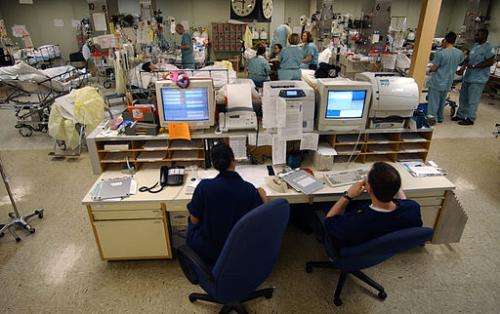Medical internet could transform health care

The medical Internet is not yet here, but the widespread availability of electronic medical records and enhanced data-storage capabilities are pushing it closer to reality. As now envisioned, this new cyberspace destination would place a wealth of aggregated, de-identified patient care information at the fingertips of health care providers, enabling them to better diagnose and treat patients, especially those who have critical, rare or complex conditions.
Giving providers easy access to a national or international database of information gathered during the practice of medicine would transform health care, said Dr. David J. Stone of the departments of anesthesiology and neurosurgery and the Center for Wireless Health at the University of Virginia.
"Historically, there has been no system to capture, store and share the massive amount of information generated during patient care," said Stone, co-author of a recent editorial in the American Journal of Respiratory and Critical Care Medicine. "While this information could be highly valuable to health care practitioners, it has either been used on an inconsistent, retrospective basis or completely wasted."
Best Practices
Stone believes the best way to use the information caregivers gather during patient encounters is to integrate it in real-time clinical workflow with extensive (big) data analytics, search engines and electronic medical records, or EMRs. Toward that end, he has been working with colleagues at the Massachusetts Institute of Technology and Harvard Medical School to publish a series of papers describing how better-designed, data-driven systems could support and improve patient care.
The group's latest paper, "Dynamic Clinical Data Mining," envisions a digitally based system that would help physicians make better, more informed patient care decisions in the face of ambiguity. Populated with aggregated and de-identified data collected during the course of care, the system would automatically search in real time for prior cases similar to the patient in question and return pertinent therapeutic and outcome information. After appropriate clinical analysis, physicians could then populate their patient's EMR with suggested interventions, as well as prognostic and other pertinent information with the support of this extensive population database.
Medical Data Mining
Acknowledging that randomized controlled trials will never be able to address the specific details of all practice issues and require supplementation with observational studies, Stone and his colleagues performed a retrospective study using data from a publicly available database, Multiparameter Intelligent Monitoring in Intensive Care. Using advanced data examination techniques – also called data mining – they found that patients in intensive care units have a greater risk of mortality when they take SSRI/SNRI antidepressants prior to admission. Study results were published recently in the journal CHEST.
"Although our study looked at the impact of specific drugs on a particular type of patient, it has broad importance. It demonstrated the general systems solution of how data mining can benefit health care," Stone said.
While many factors, such as privacy, need to be fully addressed before the medical Internet becomes a reality, Stone believes its societal benefits will be enormous. "By leveraging the knowledge gained from caring for individuals, the medical community will be able to provide better care and outcomes to all patients."
More information: "Leveraging a Critical Care Database:Selective Serotonin Reuptake Inhibitor Use Prior to ICU Admission Is Associated With Increased Hospital Mortality." Marzyeh Ghassemi, MS; John Marshall, PharmD; Nakul Singh, MS; David J. Stone, MD; Leo Anthony Celi, MD, MPH. Chest. 2014;145(4):745-752. DOI: 10.1378/chest.13-1722


















